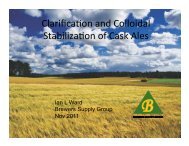Program Book - Master Brewers Association of the Americas
Program Book - Master Brewers Association of the Americas
Program Book - Master Brewers Association of the Americas
Create successful ePaper yourself
Turn your PDF publications into a flip-book with our unique Google optimized e-Paper software.
P-181<br />
Latest standards in beer dispense<br />
JOHANNES TIPPMANN (1), Klaus Dorsam (2), Albert Hovel (3)<br />
(1) TU München – Weihenstephan, Lehrstuhl für Maschinen-<br />
und Apparatekunde, Freising-Weihenstephan, Germany; (2)<br />
Berufsgenossenschaft Nahrungsmittel und Gaststatten, Mannheim,<br />
Germany; (3) Deutsches Institut for Normung, Berlin, Germany<br />
This paper gives an overview <strong>of</strong> <strong>the</strong> technical and hygienic<br />
requirements in dispense systems in Germany. Until 2003, Germany<br />
had a law concerning <strong>the</strong> handling <strong>of</strong> dispense systems. In <strong>the</strong><br />
course <strong>of</strong> streamlining <strong>of</strong> administration and <strong>the</strong> introduction<br />
<strong>of</strong> new European legislation, <strong>the</strong> old instructions were replaced<br />
by new regulations for this area <strong>of</strong> expertise. This problem exists<br />
not only for dispensing equipment. All fields <strong>of</strong> <strong>the</strong> industry have<br />
similar problems and have created advanced solutions. The laws<br />
represent <strong>the</strong> state <strong>of</strong> <strong>the</strong> art and best practices. For years, <strong>the</strong> DIN<br />
German Institute for Standardization has provides guidelines for<br />
better communication between <strong>the</strong> various parties. With <strong>the</strong> new<br />
legal situation, industrial standards have become more important.<br />
Therefore new and updated DIN standards were developed. All<br />
<strong>the</strong> requirements are exposed in <strong>the</strong>se papers. Compared with<br />
<strong>the</strong> situation in o<strong>the</strong>r countries, German hygienic and safety<br />
regulation standards are very high. They are scientifically approved<br />
and certified. In Germany <strong>the</strong>re are a number <strong>of</strong> DIN standards<br />
for dispense systems. These include technical requirements for<br />
fittings, couplings and screw threads as well as cleaning intervals.<br />
DIN standards are always kept updated and evaluated every 5 years.<br />
The author’s institution carries out experimental tests regularly.<br />
The poster will show a synopsis <strong>of</strong> available German standards for<br />
dispense systems with <strong>the</strong> most important contents like dispensing<br />
equipment, kegs, fittings, hygienic design, materials, cleaning and<br />
corresponding results <strong>of</strong> <strong>the</strong> latest tests.<br />
Johannes Tippmann graduated from university in 2004 as a<br />
diploma engineer for brewing sciences and beverage technology. In<br />
2005 he started his Ph.D. <strong>the</strong>sis studies with Pr<strong>of</strong>essor Sommer on<br />
solids handling in <strong>the</strong> brewhouse. Since 2000 he has worked as a<br />
student research assistant in dispensing systems and obtained lots<br />
<strong>of</strong> experience in this subject area. He is now responsible for research<br />
issues in dispense systems at <strong>the</strong> institute. He is also a member <strong>of</strong><br />
<strong>the</strong> Dispensing Systems Technical Committees <strong>of</strong> <strong>the</strong> Government<br />
<strong>Association</strong> for Food and Catering Industry (BGN) and <strong>of</strong> <strong>the</strong> DIN<br />
German Institute for Standardization.<br />
P-182<br />
Non-returnable kegs bigger than 5 liters as a new way for beer<br />
export<br />
JOHANNES TIPPMANN (1), Jens Voigt (1), Karl Sommer (1)<br />
(1) TU München – Weihenstephan, Lehrstuhl für Maschinen- und<br />
Apparatekunde, Freising-Weihenstephan, Germany<br />
Exporting beer all over <strong>the</strong> world creates a big problem in <strong>the</strong> return<br />
<strong>of</strong> empties. When using barrels, breweries report deficits <strong>of</strong> up to<br />
20% <strong>of</strong> <strong>the</strong> delivered containers. Growing investment costs for new<br />
barrels, high capital lockup, expensive return transport costs and<br />
o<strong>the</strong>r causes have led to new investigations in packaging beer in kegs<br />
for export. At <strong>the</strong> moment, <strong>the</strong>re are four systems which have been<br />
introduced in <strong>the</strong> market or will launched in <strong>the</strong> near future. They<br />
all are non-returnable keg-systems. One system is a keg made <strong>of</strong> PET<br />
that is comparable with <strong>the</strong> production <strong>of</strong> PET-bottles. The system<br />
has standard fittings so it can be used in every conventional tap<br />
system. The second system is also a PET-container, but it has a bag<br />
inside. The advantage <strong>of</strong> this system is that <strong>the</strong> beer can be conveyed<br />
with pressure air. The third development is also a bag-insidesystem.<br />
The technical innovation <strong>of</strong> this system is <strong>the</strong> reduction <strong>of</strong><br />
<strong>the</strong> CO 2 -content <strong>of</strong> <strong>the</strong> beer to 1 g/l. Before tapping <strong>the</strong> beer it is<br />
carbonated to <strong>the</strong> desired level. Looking like a steel keg, a one-way<br />
keg is <strong>the</strong> fourth disposable keg system. Its construction is built like<br />
a regular steel container but with <strong>the</strong> advantage that all materials are<br />
recyclable plastics. This paper compares technical and technological<br />
aspects, advantages and disadvantages. But all systems can save<br />
money when exporting beer.<br />
Johannes Tippmann graduated from university in 2004 as a<br />
diploma engineer for brewing sciences and beverage technology. In<br />
2005 he started his Ph.D. <strong>the</strong>sis studies with Pr<strong>of</strong>essor Sommer on<br />
solids handling in <strong>the</strong> brewhouse. Since 2000 he has worked as a<br />
student research assistant in dispensing systems and obtained lots<br />
<strong>of</strong> experience in this subject area. He is now responsible for research<br />
issues in dispense systems at <strong>the</strong> institute. He is also a member <strong>of</strong><br />
<strong>the</strong> Dispensing Systems Technical Committees <strong>of</strong> <strong>the</strong> Government<br />
<strong>Association</strong> for Food and Catering Industry (BGN) and <strong>of</strong> <strong>the</strong> DIN<br />
German Institute for Standardization.<br />
155



